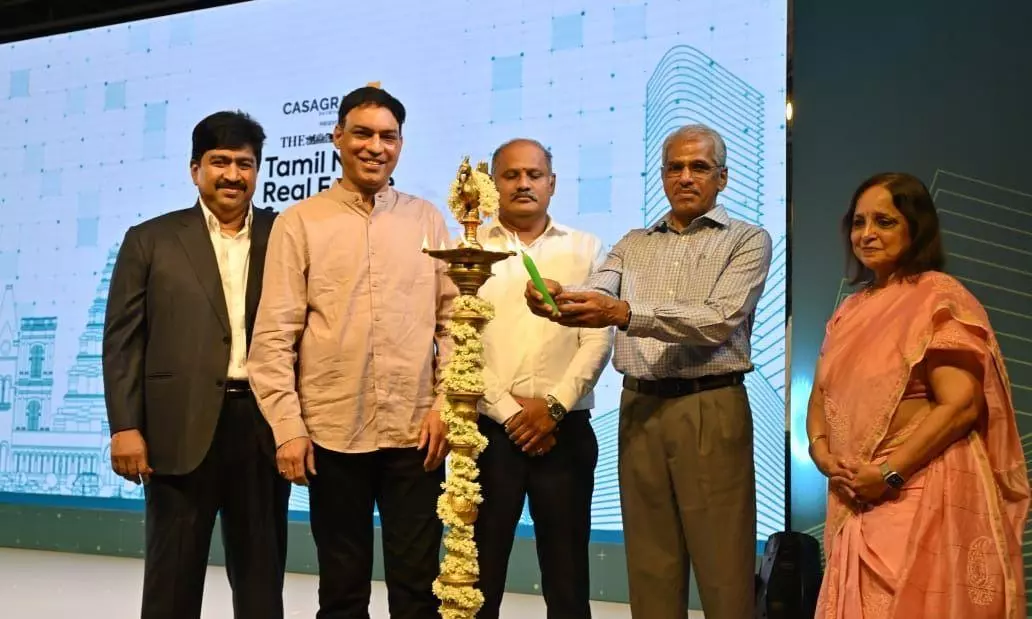
Real estate goes digital as strict regulatory norms block black money flow
Speakers at The Hindu Tamil Nadu Real Estate Summit discuss how thrust on clean paperwork, switch to online mode are improving access, transparency for homebuyers

Real estate is getting more digital, with the usage of black money in property purchases on the decline, said speakers at The Hindu Tamil Nadu Real Estate Summit 2025 on Tuesday (August 5).
The Federal was a media partner of the event.
Rise in cashless transactions
Speakers at the event said there has been a significant decline in cash transactions over the past few years, driven by stricter regulatory norms and greater financial inclusion.
Also read: Bengaluru eatery says 'no politics, real estate discussions'; netizens react
Bala Ramajyam, founder and managing director of G Square Housing, said that “cash-not-accepted” boards are now common at real estate sites. He added that the days when transactions were conducted mostly in cash are largely over. With a wide range of home loan products now available for buyers and alternative funding channels like NBFCs accessible to developers, digital payments and formal transactions are becoming the norm, he said.
Stress on transparency, compliance
As part of the ongoing digitisation of the sector, regulators too are moving services online to improve access and transparency for homebuyers. In his keynote address, Tamil Nadu Real Estate Regulatory Authority (TNRERA) chairperson Shiv Das Meena announced that the authority will now facilitate project-specific information on its website for every registered real estate project. Meena said that under Section 11 of the RERA Act, each promoter is required to maintain a dedicated page for their project on the RERA portal, with regularly updated information.
Also read: RBI rate cut: Relief for common man as car, home loans may get cheaper
He added that developers must disclose land titles, approvals, construction timelines, and financial details, as mandated under Section 4 of the Act at the time of registration. “Transparency must not be seen as a burden. It is an investment in long-term credibility and customer trust,” Meena said, urging developers to ensure that all information submitted is complete and accurate.
On-ground trends
While the regulator focused on transparency and compliance, developers at the summit highlighted on-ground trends driving growth and investment. G Square's Bala said there has been a rapid pace of infrastructure-led development in Tamil Nadu’s urban land markets. Speaking about his company’s recent projects in Coimbatore, he said, plotted layouts are now being scaled into full-fledged townships.
Also read: India's home and household market projected to hit USD 237 billion by 2030
He further observed that GST Road has witnessed faster and more sustained real estate growth than Poonamallee Road, despite the latter offering direct access to industrial corridors like Sriperumbudur and SIPCOT. The availability of metro rail, suburban trains, and bus connectivity along GST Road has played a key role in its growth, he said.
Responsible paperwork must: TNRERA chief
TNRERA chairperson Meena advised developers to improve standards in all customer-facing documentation, including allotment letters, agreements for sale, and handover papers, and said that delivery timelines should be met. Meena said clear communication and responsible paperwork could help avoid legal disputes between developers and homebuyers.
Raising concerns over violations of advertising guidelines, Meena said promotional materials often fail to provide even basic project details such as location or RERA registration status. He said advertisements must not mislead consumers and should instead provide factual, verifiable information. "We believe that advertising should empower the homebuyer with correct information and not overwhelm or mislead them,” he said, appealing to developers to study the advertising rules carefully.

